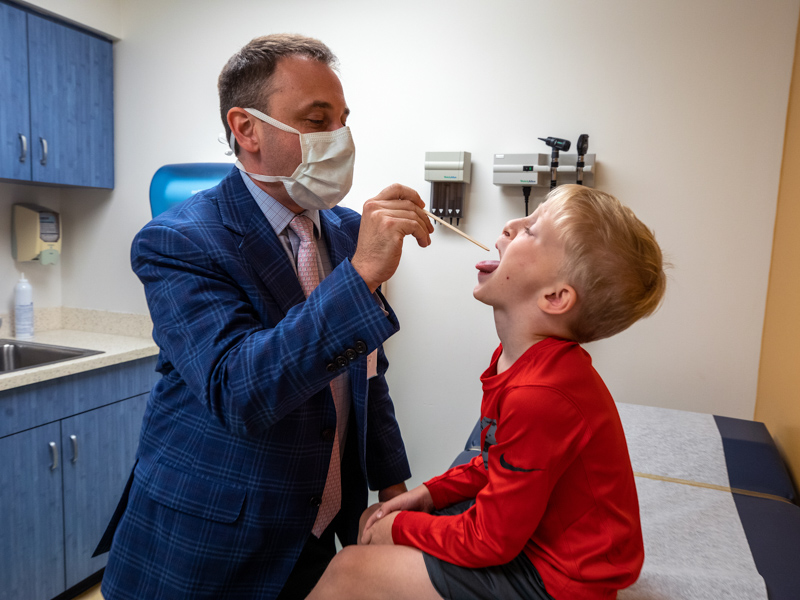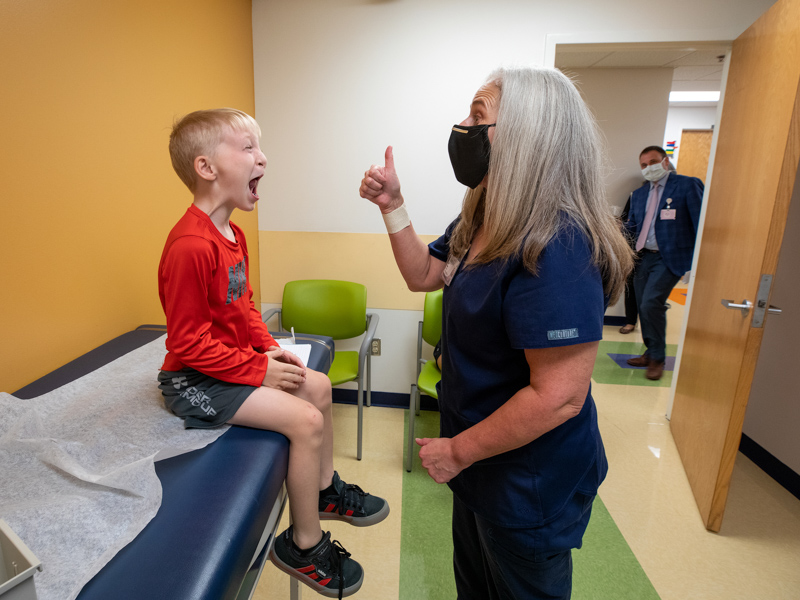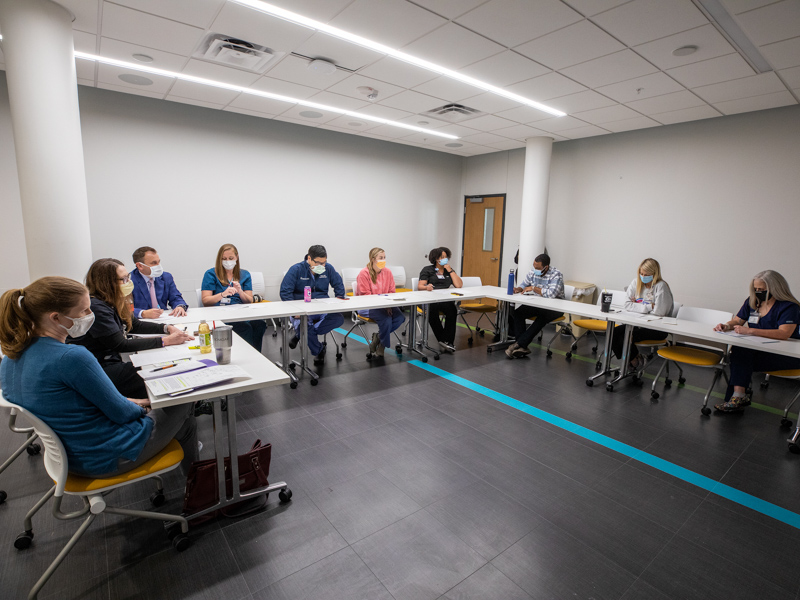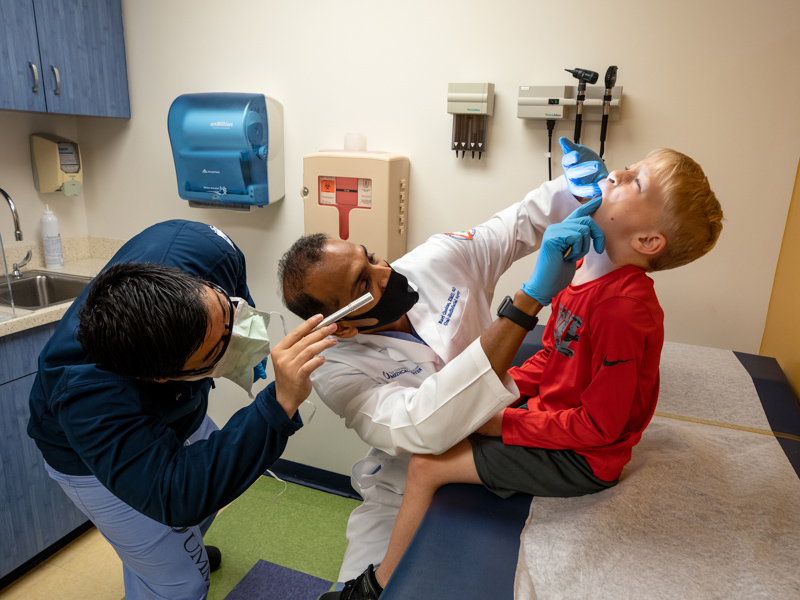State’s only nationally certified team collaborates for children’s cleft care

Cooper Beall sees eight Children’s of Mississippi specialists, including experts in plastic surgery, oral-maxillofacial surgery, dentistry, orthodontics, audiology, genetics, social work and speech therapy.
Now he can see them all in one visit. Mississippi’s only cleft team with American Cleft Palate-Craniofacial Association approval holds a multidisciplinary clinic twice a month at the Eli Manning Clinics for Children at the state’s only children’s hospital.
Cooper was born with a bilateral cleft lip and palate, the most severe cleft condition. Since birth, he’s had more than 10 surgeries, and more are in his future.

“In the first few days, I thought this was more of a cosmetic issue than anything, but it's more complex than that as I soon learned,” said his mother, Taylor Beall of Vicksburg. “His condition has affected his eating, speech, ears (including hearing), teeth, and appearance. Cooper's case was far from being just a quick lip repair after birth. His condition will need medical care well into adulthood.”
Cooper has been part of the Children’s of Mississippi family since he was born, said Dr. Ian Hoppe, surgeon-in-chief at Children’s of Mississippi and head of the cleft team. “His family has been so supportive and are a valued part of his care team, which includes experts throughout the University of Mississippi Medical Center.”
ACPA certification requires access to a multidisciplinary team including a surgeon trained in transcranial cranio-maxillofacial surgery, a neurosurgeon, a psychologist for neurodevelopmental and cognitive assessment, an ophthalmologist, a social worker, a geneticist, a speech therapist, a dentist and an orthodontist.
Children born with cleft lips, palates and facial clefts may have issues with breathing and feeding, and later, with speech. Patients with rare clefts that involve the eye also need ophthalmology care.

“ACPA’s standards for approval are high, so we take pride in being an ACPA-approved cleft team,” Hoppe said. “The resources of UMMC allow us to offer the complete spectrum of care needed by patients born with cleft lips, cleft palate and complex facial clefts.”
About one in every 1,600 babies is born with a cleft lip and palate, according to the U.S. Centers for Disease Control and Prevention. Complex facial clefts are very rare, and their prevalence is not well understood.
Children born with cleft lips, cleft palates and facial clefts need care from a variety of specialists throughout their childhoods and into adolescence, Hoppe said. The multidisciplinary cleft clinic at Children’s of Mississippi includes them all.
“Babies with cleft lips and palates can have problems feeding, so we have a feeding specialist on our team. Children who have surgery for their clefts need pediatric anesthesiologists to put them to sleep because of the unique anomalies their airways can have, so they’re a part of our team and at each surgery we do.”
By about 18 months to 2 years old, children born with clefts begin to see speech therapists, and it’s important that their speech therapists “know how to care for children with clefts,” Hoppe said. “Our speech therapist Kara Gibson specializes in cleft patients.”
Eating and speech have been the biggest functional hurdles for Cooper, Beall said.
“Cleft children tend to have eating issues,” she said. “Luckily, we have had the best support with Kara Gibson and Dr. Hoppe, helping us overcome each issue. He began speech therapy at 3 years old, due to delay in speech and articulation. Dr. Hoppe has worked diligently to make sure Cooper has the structure to create the sounds needed for normal speech. ... This has helped Cooper's confidence in talking to people and has helped him with reading and articulation.”
As cleft patients grow up, they need frequent dental exams because clefts can make dental hygiene more difficult. “It’s important for these patients not only to have a pediatric dentist but one who is experienced in caring for children with clefts,” he said.
Children born with clefts have surgery on clefts in their gum line before their adult teeth begin to grow in.

“Cooper is getting to the point when his hard tissue structures (maxilla and mandible) will need to be addressed,” said Dr. Ravi Chandran, chair of oral-maxillofacial surgery in the School of Dentistry at UMMC.
The surgery will involve grafting bone from his hip to the cleft in his palate. Hoppe and Chandran will perform the procedure together.
Later, Cooper will need orthodontic alignment and orthognathic surgery on his jaw.
“This is a clear example of the interdisciplinary approach,” Chandran said. “It will involve plastic surgery, orthodontics, oral-maxillofacial surgery and pediatric dentistry.”
Child psychologists on the team screen for any developmental issues, and social workers check to make sure patients’ families have resources ranging from food and transportation to educational help.
“Many of our families are fine,” said social worker Brittannie Goodman, “but if they need anything, we’re here for them and can connect them to resources.”
The multidisciplinary cleft clinic at Children’s of Mississippi can be a “hub where families can plug into for referrals to otolaryngologists, ophthalmologists, neurologists, orthopaedists and other specialists as needed,” Hoppe said.
After the day’s patients are seen, the cleft team members confer, sharing their viewpoints on each patient’s condition and planning future care together.
“Being able to collaborate as a team gives us insights into each patient’s condition and how we can work together to offer them the best care,” Hoppe said. “Through our multidisciplinary clinic, we can offer patients all the expert care they need all in one place.”


